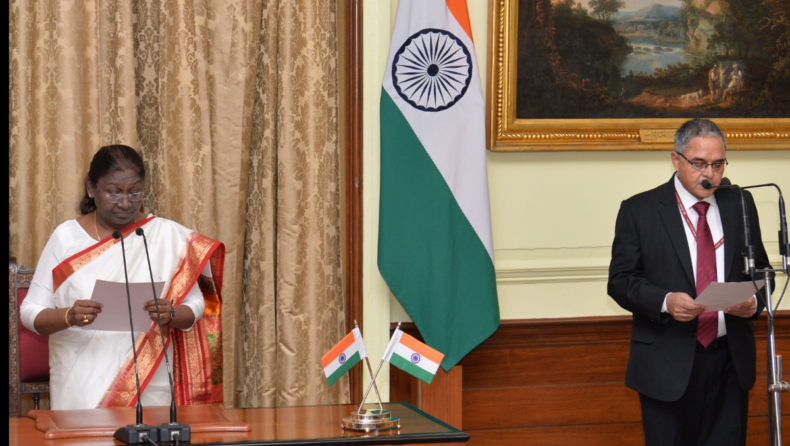At the Rashtrapati Bhavan in New Delhi, President Droupadi Murmu, Vice President M. Venkaiah Naidu, and Prime Minister Narendra Modi swore in newly appointed Central Vigilance Commissioner Suresh N. Patel.
Suresh N. Patel was appointed chief of the Central Vigilance Commission, and he took the oath of office in front of President Droupadi Murmu, the Vigilance Commissioner. Suresh N. Patel was appointed as the Central Vigilance Commissioner on Wednesday, one year after the post became vacant. Suresh N. Patel took the oath of office in front of President Droupadi Murmu and Vigilance Commissioner Suresh N. Patel.
https://twitter.com/rashtrapatibhvn/status/1554698721605996544?s=20&t=1TB_4aOqAMQVXoK4cp3_Bg
Mr. Patel, who has been serving as the acting Central Vigilance Commissioner (CVC) since June of this year, was officially sworn in as the chief of the probity watchdog Central Vigilance Commission by President Droupadi Murmu at the Rashtrapati Bhavan here in New Delhi.
According to a report that was published by the Press Trust of India (PTI) the previous month, Patel’s appointment as CVC was reportedly approved by a selection committee led by Prime Minister Narendra Modi.
At a ceremony that took place today at Rashtrapati Bhavan at 1000 hours, Shri Suresh N. Patel was given the oath of office to serve as the Central Vigilance Commissioner. According to a communique that was released by the Rashtrapati Bhavan on Wednesday, he took the oath of office in front of the President and signed it with his signature.
Prime Minister Narendra Modi and Vice President M. Venkaiah Naidu were both present at the ceremony as well.
About The Central Vigilance Commission (CVC)
The Government of India’s Resolution of 11.2.1964 established the Central Vigilance Commission (CVC) in 1964 as an apex body to exercise general supervision and control over vigilance administration. The Resolution gave the CVC the authority to look into any transaction in which a public servant is suspected or alleged to have acted dishonestly or corruptly, regardless of that person’s status. The government has expanded the Commission’s duties and authority through subsequent laws and ordinances.
The Bill was reintroduced in 1999 and remained in Parliament until September 2003, when it became an Act after passing both Houses and receiving the President’s assent. The provisions of the Act include inquiries into offences allegedly committed by certain categories of central government public servants, corporations established by or under any central Act, government companies, societies, and local authorities. To implement the Act of 2003, the Commission exercises all powers and functions entrusted to it by a Government of India Resolution.
Important Elements of the 2003 CVC Act
- The Commission consists of a Central Vigilance Commissioner (Chairperson) and not more than two Vigilance Commissioners (members).
- The Central Vigilance Commissioner and the Vigilance Commissioners are appointed by the President on the recommendation of a committee consisting of the Prime Minister (Chair), the Minister of Home Affairs (Member), and the Leader of the Opposition in the House of People (Member).
- The Central Vigilance Commissioner and the Vigilance Commissioners will serve for four years or until age 65, whichever comes first.
- During the investigation, the Commission will have certain civil court powers.
Who is Suresh N. Patel?

In April 2020, Mr. Patel was named the vigilance commissioner. Before that, he was the managing director and chief executive officer of Andhra Bank.
Sanjay Kothari, a former officer in the Indian Administrative Service (IAS), finished his job as CVC on June 24, 2017.
The Central Vigilance Commission is run by a Central Vigilance Commissioner, and it can have up to two vigilance commissioners. At the moment, the Commission doesn’t have a vigilance commissioner.
In July, a panel of three people led by the Prime Minister met to choose the CVC and vigilance commissioners. The union home minister and the Leader of the Opposition in Lok Sabha make up the other two members of the panel.
During the meeting, the group agreed that Patel should be the CVC. It also agreed to make Arvind Kumar, the former head of the Intelligence Bureau, and Praveen Kumar Srivastava, a former bureaucrat, vigilance commissioners.
A government official said that “CVC Patel will swear in both Kumar and Srivastava as vigilance commissioners on Wednesday.”
On June 30, Mr. Kumar’s time as head of the Internal Security Intelligence Agency ended.













